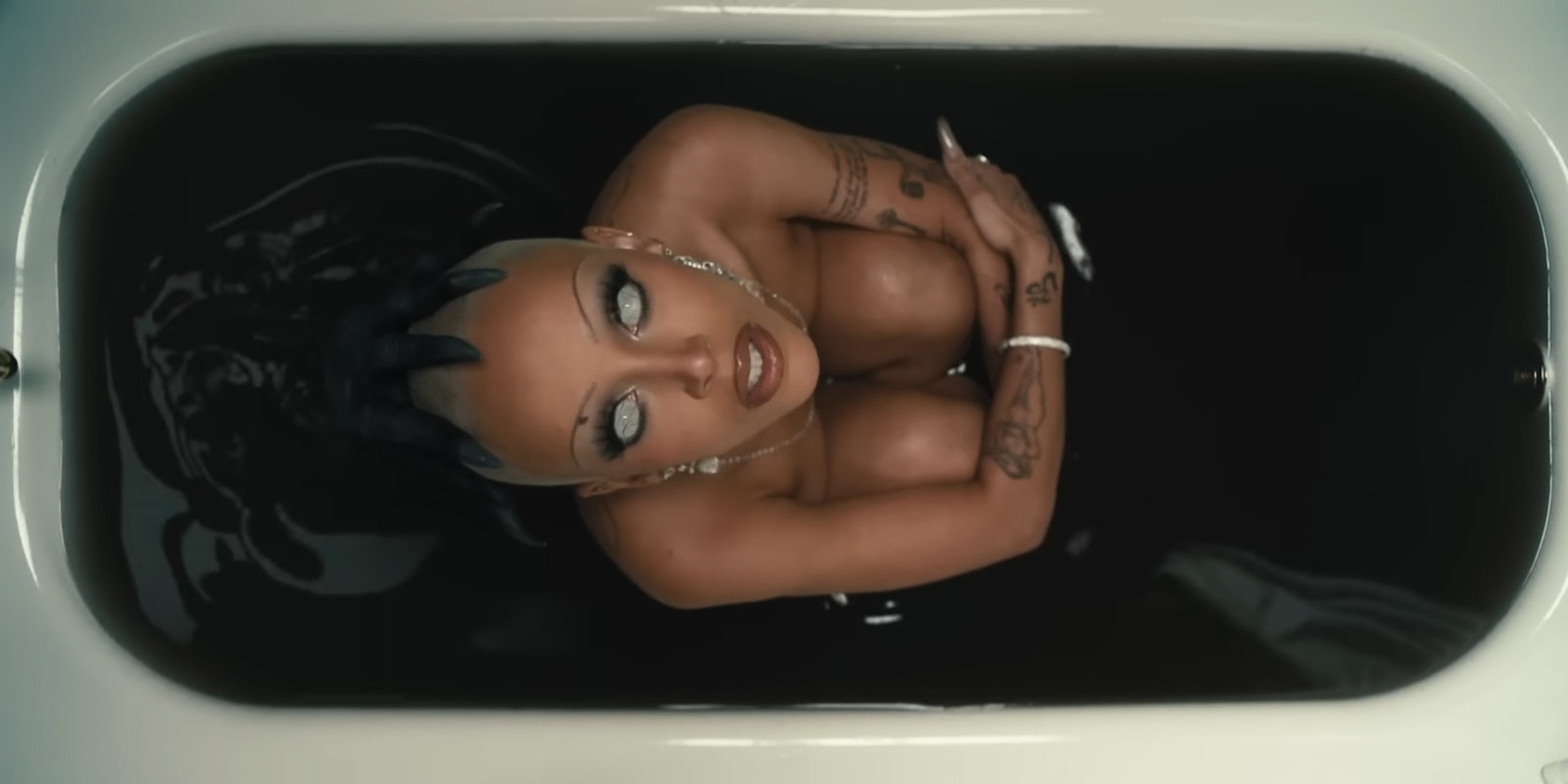Ever since rappers started making waves in the music industry, there’s been a notable dance around religion, with many using satanic imagery to spark debate, court controversy, or convey deeper meanings. Doja Cat and her relationship with religion is no exception.
What is Doja Cat’s religion?
Doja Cat shares details about her personal life sporadically. As far as we know, she was born to an Ashkenazi Jewish mother and has identified as Jewish. Nevertheless, the rapper’s spiritual journey extends well beyond a single faith. During her childhood, she spent several years in an ashram, where she engaged with and studied Hinduism
Is Doja Cat a Satanist? An artist and her transformative persona
Doja’s metamorphosis before the launch of her fourth studio album, “Scarlet,” was visually staggering. Buzzed hair, tattoos symbolizing dark undertones, and the unveiling of a gory and bloodied alter ego called “Scarlet,” have made headlines.
Her songs from this album only intensified the satanic allusions—songs like “Paint The Town Red” and “Fuck The Girls” flirted with devilish connotations. This bold transformation led to rampant speculation about Doja Cat’s religion and her relationship with Satanism.
However, Doja Cat is hardly the first artist to be accused of incorporating Satanic imagery into her work. For centuries, specifically during Antebellum slavery, African Americans were often perceived as demonic or lacking in Christian-based godliness. Drums, an integral part of their culture, were banned because of their ability to communicate, and genres originating from singing traditions like blues and jazz were stigmatized as the devil’s music.
Rap’s dance with demonic and religious imagery
Santanic Panic also extended to hip-hop, with acts like Three 6 Mafia, Tyler the Creator, and, more recently, Lil Nas X stoking controversy for including demonic imagery and satanism into their work. From the early days of hip-hop to the present, rappers have been no strangers to controversy. While heavy metal bands were being criticized for hidden satanic messages in their music, rappers like N.W.A faced surveillance and harassment from law enforcement authorities.
Like Doja Cat, the treatment these acts received motivated the artists to dive deeper into demonic themes. The Nineties saw the rise of horrorcore, a niche subgenre of hip-hop that unapologetically embraced dark and eerie elements. Artists like Flatlinerz, Bone Thugs N Harmony, and Gravediggaz explicitly depicted satanic rituals, brutal violence, and overtly dark themes in their work.
Yet, for many of these artists, their on-stage persona and off-stage beliefs were starkly different. DJ Paul of Three 6 Mafia, reiterated many times that the members of the group were far from practicing Satanists.
The 2000s saw a decline in horrorcore’s popularity, but artists like Tyler, the Creator, and Lil Uzi Vert revived the relationship between hip-hop and satanism. They, along with their peers, used satanic symbolism not out of genuine belief but as a tool to challenge societal norms, gain attention, and make a statement.
Lil Nas X and the contemporary satanic wave
Lil Nas X’s “Montero (Call Me by Your Name)” video, where he confronts and embraces his demonic side, challenged the idea that being gay is sinful, and flipped the script on traditional religious narratives.
Yet, not everyone in the hip-hop community embraces this trend. Punch, the co-president of Top Dawg Entertainment, voiced concerns about the overtly demonic influence in today’s music, underlining the historical connection between African Americans and Christianity.
Doja Cat: Embracing the controversy
Doja Cat’s “Paint the Town Red,” her second number-one single, captures the essence of her controversial and provocative nature. After confronting her fans about their obsessive behavior, she lost a quarter-million followers. Undeterred, she further engaged in religious controversy by adopting Illuminati symbols and used songs like “Paint the Town Red,” “Demon,” and “Attention” to artfully transformed online criticism into chart-topping successes.
It’s also worth noting that Doja Cat also identifies with other religions. She was born to an Ashkenazi Jewish mother and identifies as Jewish. This, along with the fact that she spent four years of her childhood living in an ashram and practicing Hinduism, offers an added layer of complexity to her relationship with religion and her artistic choices.
Incorporating demonic imagery in music, especially rap, is not necessarily about promoting satanism but frequently serves as a commentary on the struggles of being Black in America. It’s also a medium to challenge societal norms, engage with fans, and court controversy.
Whether used as a tool, an identity, or a form of rebellion, the intertwining of rap and religion will forever remain a poignant and controversial aspect of hip-hop culture.


